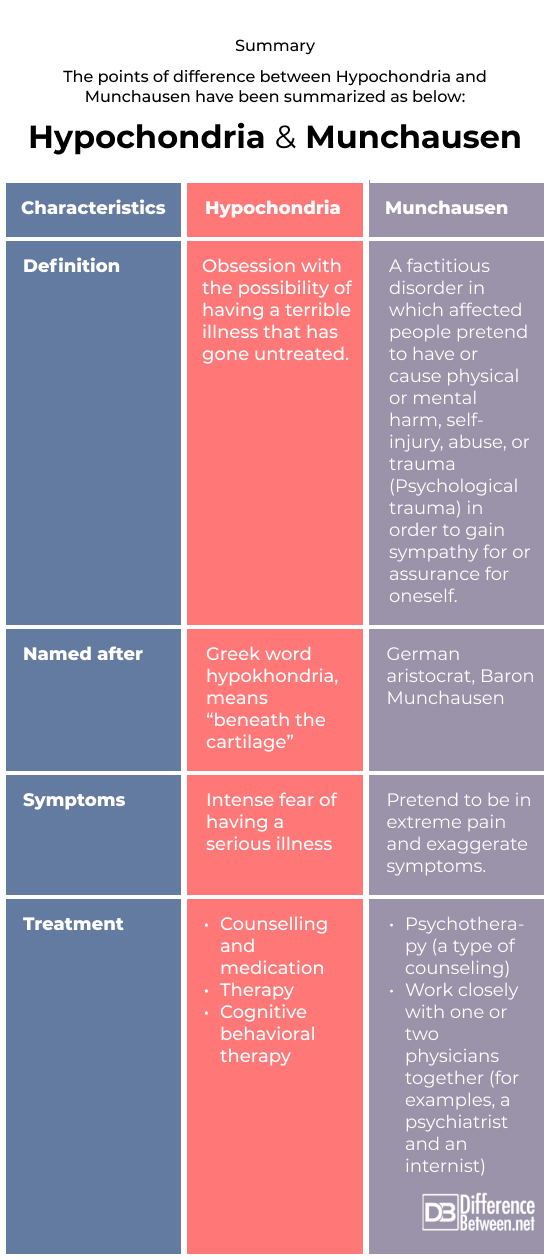Difference Between Hypochondria and Munchausen
As with Munchausen syndrome (factitious disorder imposed on self), it can be difficult to identify hypochondria because there are sometimes no real or actual signs to back up the sufferer’s fears. Contrary to Munchausen syndrome (a mental illness because it is associated with severe emotional difficulties), however, hypochondria (anxiety disorder) is not characterized by deliberate lying or symptoms exaggeration.

Hypochondria
One sort of anxiety problem is hypochondria sometimes also termed as hypochondriasis, anxiety disorder or, health anxiety. It’s not unusual for anyone to occasionally be concerned about their health. However, those suffering from hypochondria have this terrible feeling and are extremely concerned that they are, or will soon be, terribly ill.

Munchausen
A person with Munchausen syndrome constantly and purposefully acts as though they have a physical or mental ailment when they are not actually ill. This condition is known as a factitious disorder (a serious mental disorder in which a person deceives others by appearing ill, by purposely getting ill or by self-harm). Because it is linked to significant emotional issues, Munchausen syndrome is regarded as a mental health problem.
The most severe form of factitious condition is called Munchausen syndrome, after Baron von Munchausen, a German officer from the 18th century who was infamous for embellishing the accounts of his life and experiences. Instead of being signs of a mental condition, Munchausen syndrome patients typically have physical symptoms like fever, stomachaches, and chest pain.
Difference between Hypochondria and Munchausen
Definition
Hypochondria
Those suffering from hypochondria have this terrible feeling and are extremely concerned that they are, or will soon be, terribly ill.
Munchausen
A rare psychiatric and behavioural condition known as Munchausen’s syndrome (factitious disorder imposed on self), occurs when a person creates or experiences signs of illness in oneself.
Causes
Hypochondria
Although the precise underlying causes of hypochondria are unclear, there are a number of things that could influence the onset of this condition.
Previous Sickness
People who suffer hypochondria may have previously struggled with a significant disease that made them overly concerned about their health.
Family Background
Individuals who have a family history of the disorder are more likely to develop it themselves, suggesting that hypochondria may have a hereditary component.
Trauma
People with hypochondria (anxiety disorder), including those with Munchausen syndrome (Factitious disorder imposed on self), may have experienced trauma or abuse as children.
Knowledge Availability
As people may overreact to symptoms after studying potential ailments online, the accessibility of internet medical information may also contribute to the emergence of hypochondria.
Munchausen
- Childhood emotional stress or sickness frequently that required considerable medical care.
- A mental health problem known as a personality disorder result in patterns of deviant thought and behaviour.
- a vendetta against authorities or medical personnel.
Treatment
Hypochondria
- Stress management and Relaxation technique
- Counselling and medication
- Therapy
- Cognitive behavioral therapy
- Counseling psychology
- Desensitization
- Psychoeducation
- Mindfulness-based stress reduction
Munchausen
- Get awareness about self-harm and education about the repercussions of self-harm
- Psychotherapy (a type of counseling)
- Work closely with one or two physicians together (for examples, a psychiatrist and an internist)
Summary
The points of difference between Hypochondria and Munchausen have been summarized as below:

FAQ:
Is Munchausen a hypochondria?
Contrary to malingering or hypochondria (health concern), Munchausen’s syndrome is a distinct condition. A person with hypochondria has a psychological problem where they are afraid of getting sick. They misinterpret physiological processes as indicators of serious illness. Munchausen syndrome patients do not feel or believe that they have any illness.
What is the difference between a factitious disorder and a hypochondriac?
Hypochondriasis and factitious disorders (“intentional production or feigning of signs or disabilities, either physical or psychological”) differ significantly in one important respect: hypochondriacs (people suffering from anxiety disorders) feel they are unwell, whereas factitious disease sufferers do not.
What is the difference between hypochondria and hypochondriasis?
There is no difference between hypochondria and hypochondriasis. Hypochondria is an anxiety disorder that is also termed as hypochondriasis.
What is hypochondria called now?
Somatic symptom disorder (SSD) and illness anxiety disorder (IAD).
Who is most likely to have hypochondria?
People suffering from anxiety disorders, depression, obsessive-compulsive disorder (OCD), personality disorders are at high risk of hypochondria
Why is it not called Munchausen anymore?
This appellation (title) was given to a persona by the name of Baron Munchausen, who was renowned for hallucinating/fabricating tales. A person’s behavior is better described by the switch from Munchausen syndrome by proxy to factitious disorder (Factitious disorder imposed on self) imposed on another.
Is hypochondria a form of mental illness?
Hypochondria is a kind of anxiety problem. It is sometimes referred to as hypochondriasis, disease anxiety condition, or health anxiety. It’s common for folks to occasionally worry about their health. However, those who have hypochondria are extremely concerned that they are, or will soon be, terribly ill.
What not to say to a hypochondriac?
Things you shouldn’t say to hypochondriac are:
“You will come out of it/Snap out of it.”
“It is just in your head”
Is hypochondria OCD or anxiety?
Hypochondria is an anxiety disorder.
- Difference Between Global Warming and Greenhouse Effect - May 18, 2024
- Difference Between Vaccination and Immunization - March 3, 2024
- Difference Between Selective Mutism and Autism - February 25, 2024
Search DifferenceBetween.net :
Leave a Response
References :
[0]Ayoub, C. C., Alexander, R., Beck, D., Bursch, B., Feldman, K. W., Libow, J., ... & Yorker, B. (2002). Position Paper: Definitional Issues in Munchausen by Proxy: APSAC Taskforce on Munchausen by Proxy, Definitions Working Group. Child Maltreatment, 7(2), 105-111.
[1]Creed, F., & Barsky, A. (2004). A systematic review of the epidemiology of somatisation disorder and hypochondriasis. Journal of psychosomatic research, 56(4), 391-408.
[2]Nissen, B. (2018). Hypochondria as an actual neurosis. The International Journal of Psychoanalysis, 99(1), 103-124.
[3]Sousa, D. D., Kanomata, E. Y., Feldman, R. J., & Maluf, A. (2017). Munchausen syndrome and Munchausen syndrome by proxy: a narrative review. Einstein (Sao Paulo), 15, 516-521.
[4]Image credit: https://www.canva.com/photos/MAEJCKMOcVA-man-in-isolation-at-home-for-virus-outbreak-or-hypochondria/
[5]Image credit: https://www.canva.com/photos/MADQ5snsZXc-stethoscope-on-a-medical-record/
